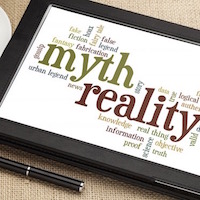If you’re thinking of hiring a publicist, one of the first questions you’re likely to ask is:
“Do you have good contacts?”
Authors ask me this every day. While it would be easy for me to say, “Of course!” (and to add with a glint in my eye, “if you just sign on this dotted line,you’ll see…”) it would be misleading. Not because I don’t have contacts. Rather, because the very notion that contacts will lead to media placements is a great big myth it’s time to dispel.
Think about it. Our press corps is immense. Far beyond book reviewers, there are bloggers and producers and editors and staff writers covering every topic under the sun from food and travel to fashion, psychology, money, health and gardening — even adhesives. Seriously. My Vocus media database boasts an archive of 1.6 million media contacts and growing.
Like most PR pros, my work, too, spans a wide range of topics. I’ve promoted everything from business books to crime novels and literary fiction. While publicizing Alden Jones’ dazzling travel memoir The Blind Masseuse, I reached out to reporters covering travel and specific Latin American countries. For Lisa Borders’ literary novel The Fifty First State set in southern New Jersey, I was in touch with — you’ve got it — the South Jersey press. (Yes, there is such a thing.) While working on Ashley Warner’s rape memoir The Year After I dug up names of reporters who focus on women’s health. I also figured out who happened to be producing news about the college campus sexual assault stories that were making headlines at the time. The list goes on and on.
Can anybody possibly know all these contacts? Absolutely not. That’s what databases are for. Besides, the media is notorious for high turnover. A great contact who’s here today could very well be gone the next.
Instead, what a good publicist knows is how to find the news angle in any given book or project. Because the single most important factor in garnering coverage is the story itself. Reporters, reviewers, bloggers, producers and news editors are all looking for specific types of news stories presented in fairly specific ways. Mining those stories from each given book and each author’s personal history and then crafting pitches that will capture reporters’ attention is a publicist’s real job. It’s a creative thinking and writing exercise and the most important skill you should be looking for in hiring someone to help promote your book.
True, somebody who knows your publicist may be more likely to read his emails or take her call. But — like with querying agents you’ve been introduced to or met at a conference — if the story’s not of interest, the conversation still ends there. We publicists get rejected by even the best of contacts every day. On the flip side, the right story will get the attention of total strangers. Which just goes to show that thankfully, our press corps really is open, fair and democratic — to the extent that the content fits its needs. In other words, people in the media aren’t going to just dole out prime time spots to their cousins or best friends.
At this point you might be wondering, so what about those big-name places like Oprah and NPR? Don’t you need a contact to get in there? And won’t my publicist’s personal connections be my ticket to coverage? Here, too, the same answer applies: with the right story, all you need is somebody’s contact information. Again, that’s what databases are for.
There is one caveat, though, when dealing with top outlets: asI’ve mentioned before, for top outlets the definition of “the right story” includes who you are as a public figure and / or who your publisher is.
So what question should you ask independent publicists you’re considering working with instead of “Do you have good contacts?”
First, ask him or her to show you the results of campaigns similar to yours. A good publicist should keep a record of all the media clips his or her work has yielded.
Second, ask for references. Talk to people who have worked with the publicist you’re considering and ask how satisfied they were with both the working experience and the results.
Third, ask his or her opinion about what your book’s news angles are and see if these ideas resonate.
Last but not least, know that the very best way to determine your book’s news angles is to actually read it. So you should by all means make sure your publicist intends to give your book a thorough read.
